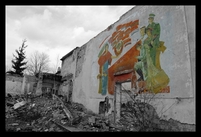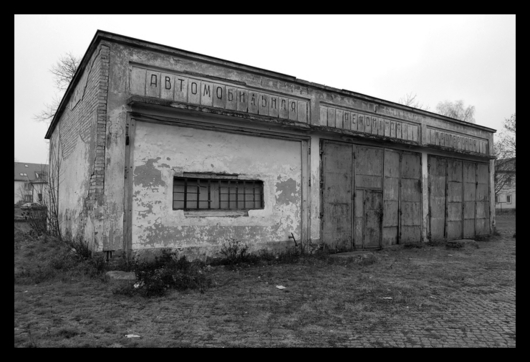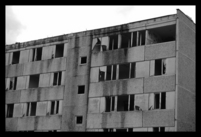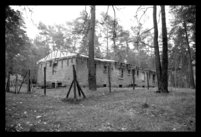 Borne Sulinowo - Twenty years back, you could not locate this town on any map.Today, history buffs and adventure seekers from all over Europe come to discover the secrets that the Nazis and the Soviet army left behind. Borne Sulinowo, in the northwest of Poland, offers Hitler's bunkers, kilometers of underground tunnels and Soviet nuclear warhead shelters. Even Poles without a particular interest in military history are moving here to find a better life.
Borne Sulinowo - Twenty years back, you could not locate this town on any map.Today, history buffs and adventure seekers from all over Europe come to discover the secrets that the Nazis and the Soviet army left behind. Borne Sulinowo, in the northwest of Poland, offers Hitler's bunkers, kilometers of underground tunnels and Soviet nuclear warhead shelters. Even Poles without a particular interest in military history are moving here to find a better life. Beaches, lakes and secrets
Some newly reconstructed apartment buildings are located in the middle of the forest. There are lakes full of fish with gorgeous sandy beaches close by and asphalted paths leading to the most remote parts of the area.
A school, sports field and a cultural center are also in place.
This "forest city", formerly called Gross Born, may seem like a dream location at first, especially for weary residents of industrializes metropolises.
Underground city?
The whole area was a tightly secured military zone, where no regular civilian set foot for sixty years.
The first occupants were the Nazis, who had constructed an elaborate complex of underground bunkers here in 1932-1939. Yet, the military masterminds left no plans or documentation behind.
Groups of local military enthusiasts-archeologists keep finding previously unseen bunkers, passageways and secret underground rooms. Once in a while there are reports in the Polish media about some explorer who claims to have found an underground Nazi factory, hospital or even a railroad.
In most cases, there is little credible evidence for these claims, but sometimes real artifacts are discovered.
During the reconstruction of a pub in the center of the city, an underground power line system was uncovered. With a little imagination, of course, such a prompt can create a slew of stories about an underground city inhabited by thousands of people.
Land mines and nuclear missiles in the backyard
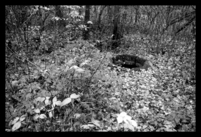 The Soviet army took over this wooded defense post without a single shot and settled here after World War Two.The bunkers were so ingeniously places and thoroughly hidden, though, that the newcomers did not even find all of them during their prolonged stay.
The Soviet army took over this wooded defense post without a single shot and settled here after World War Two.The bunkers were so ingeniously places and thoroughly hidden, though, that the newcomers did not even find all of them during their prolonged stay.Having placed nuclear weapons all around these woods, the Soviets were less interested in rotting bunkers than in building apartment blocks for the thousands of military personnel and their families who were to work here.
The whole of the military complex was booby-trapped and used for military exercises.
Having served for years as a military training ground, the earth here still hides some dangers. One can easily find an unexploded mine on a walk through the forest. Though the immediate surroundings of the inhabited area have been cleared, there is still no assurance about the rest of the area, which is bigger than Prague in size.
Sasha's groceries
On the main Nepodleglost street, which at one point was called Adolf Hitler Strasse and later, Komienkova street, after a local general, two machine guns are pointing at a reconstructed five-story building standing across the way. The small building behind them houses the local shopping zone.
Nostalgically, it retained the Russian-tinted name, "Magazin Sasha". There is a barbershop and a video rental store. Everything looks more massive than in other Polish cities, but it is all fixed up and somehow cozy.
The old barracks in the middle of the forest have been converted into apartments, to the delight of the locals who are thrilled about the wooded surroundings.
The drawback is that a few meters away is an awful-looking ten-story building with knocked-out windows and writing in the Russian alphabet all over it. There are two more like that next door.
The area was de-mined only recently, and unemployment is still above 25 percent.
Ghost town
Fifteen kilometers down a pothole-filled road from the city, there is a town called Klomino. It's a ghost town now, though.
Huge prefab apartment blocks stand along parallel streets.You can still see some of the wallpaper through the broken windows. Wind whizzes around the abandoned buildings, giving goose bumps to the occasional visitor.
There must have been thousands living here. Though now, the only sign that remains of this town's glory is the last wall of a collapsed movie theater adorned with colorful Soviet propaganda.
Klomino is only one of many such ghost towns in the area of the old military base.
Conspiracy theories
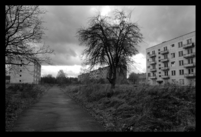 Borne Sulinowo's wooded surroundings are unique for a city in Poland, and maybe in all of central Europe. Trees were cut down only in places where it was necessary.
Borne Sulinowo's wooded surroundings are unique for a city in Poland, and maybe in all of central Europe. Trees were cut down only in places where it was necessary. The river Pilava flows through the area and only a few minute walk from the city center will bring you to lake Pile. Today's recreational area used to breed many conspiracy theories.
Some claim that during the cold war, there was a tunnel connecting the lake to the Baltic Sea, which lies less than a hundred kilometers from here. Some locals, who served at the base, swear they had seen Soviet submarines in the lake.
Andrzej Michalak, an enthusiast for local history who runs the city's museum, is skeptical. "There was nothing like that here," he says.Yet even he admits that there are unusual places he finds on his regular walks around the area, which are not marked on any maps.
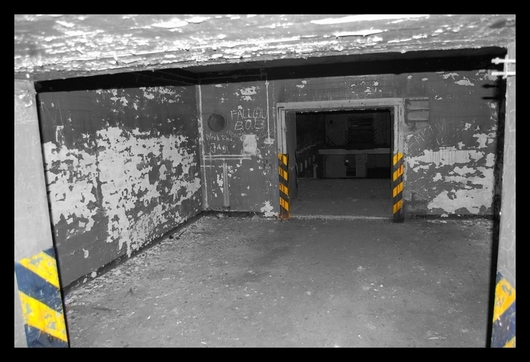 "I have some secret places of my own. But I won't tell about them yet," says Michalak. He is absolutely convinced that something new will be uncovered this summer, something no one had seen before.
"I have some secret places of my own. But I won't tell about them yet," says Michalak. He is absolutely convinced that something new will be uncovered this summer, something no one had seen before.Maybe it will be another section of the underground railroad, a secret German arms stockpile, or another hospital, who knows.

